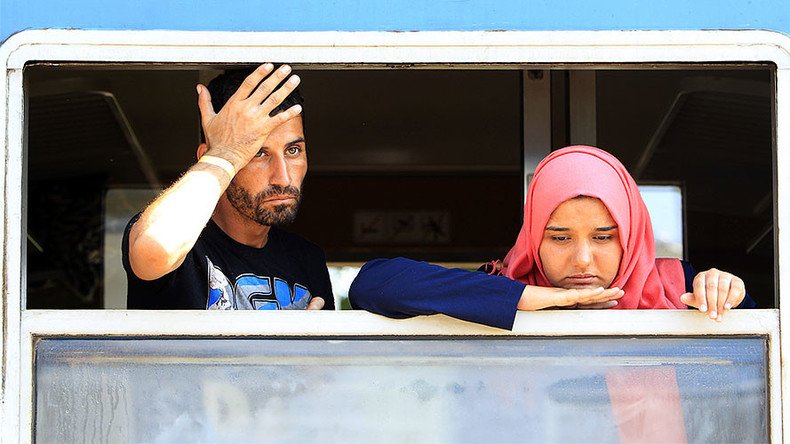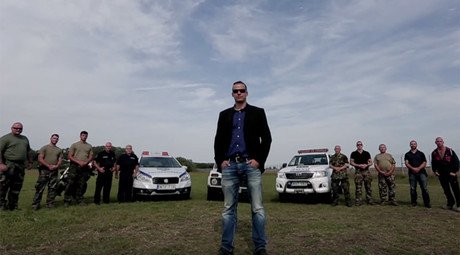Hungarian Muslims slam town’s ban on burkas & construction of mosques

A major Muslim organization in Hungary has hit out at the “increasing xenophobia and serious Islamophobia” in a town that recently banned the construction of mosques and the wearing of burkas – allegedly to prevent large-scale immigration.
Home to about 4,000 people, Asotthalom made the headlines after its right-wing mayor, Laszlo Toroczkai, filmed a cringeworthy Hollywood-style video in which he protects the southern border with Serbia from immigrants with a few trusted men by his side. This shot him to prominence in 2015, at the height of the European migrant crisis.
The current ban, on top of a 'no' to the construction of mosques, also includes readings by muezzins at prayer times, the wearing of all forms of veil – including the burkini – and the promotion of LGBTQ identities.
The mayor unveiled the new regulations in a Facebook post dated November 23. He explained the move saying this was to “protect the community and its traditions from any mass settlement from outside” as “more than 90 percent of refugees are Muslim.”
Toroczkai, also a leading figure in the country’s far-right Jobbik party, has maintained that the ruling is intended to “protect the community and its traditions from any mass settlement from outside.”
Hungary officially said this summer that more than 19,000 migrants and refugees have arrived on its soil this year – 14,000 of whom did so illegally.
The mayor’s statement has left the Hungarian Islamic Community (MIK) in shock at “the increasing xenophobia and serious Islamophobia in Hungary, which has now peaked with the decree.” The group also said that it had made a written request to the constitutional court to examine the decree, according to Hungarian news portal Index.Hu.
The group explained that despite being a minority, Hungarian Muslims are Hungarians all the same, and should enjoy the same constitutional protection as other citizens.
“We cannot ‘go home’ anywhere as this is our homeland,” the statement also says, as cited by the Guardian. A letter sent to Prime Minister Viktor Orban, a fierce critic of the EU’s immigration policy, did not receive a response, according to MIK.
Founded in 1990, MIK is the oldest group in Hungary representing Muslims, and has an estimated 40,000 members. Interestingly, 2011 census statistics put the total population of Muslims in Hungary at only 5,579.
The Hungarian Greek Catholic Church, by contrast, has more than 326,000 members.
Last month, Hungary held a referendum on asylum seeker quotas. Although 98.3 percent of the voters said they did not want the EU dictating the rules, they did not reach the required turnout of 50 percent, thus invalidating the vote.
This did not stop Orban from going before parliament to report that he is “initiating an amendment to the constitution,” without providing further details. But this was not enough for the anti-immigrant Jobbik party, whose leader, Gabor Vona, told Orban at the National Assembly: “You will not be taken seriously by Brussels bureaucrats. Brussels will ruthlessly exploit your irresponsibility and mistake.”
The Hungarian PM has been a stubborn opponent of German Chancellor Angela Merkel, who insists that EU states are obliged to share the burden of taking in refugees that have been arriving in Europe during the ongoing migrant crisis.
Orban said that Muslim migrants from the Middle East and North Africa will pose a security risk for the mainly Christian Hungary.
According to Orban, accepting or rejecting migrants is a matter of national sovereignty, and Hungary has already erected two fences to keep illegal migrants out. The country lies on the so-called ‘Balkan route’ into Europe, through Serbia, which was also feeling the strain of being used as a gateway.
The crisis itself began at the end of 2014, and saw more than 1 million refugees and migrants arrive to the EU, with numbers dropping slightly this year. Hungary has been adamant in its opposition to following EU regulations on migrant quotas. In August, Orban decided to dispatch more than 3,000 new police officers to patrol the borders with Serbia and Croatia.













